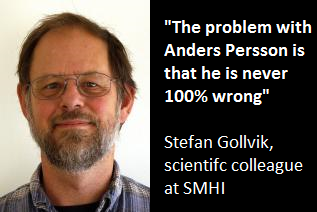The 11th advice to young scientists: – You must risk being unpopular!
Contributed by Anders Persson, a HEPEX guest columnist for 2014
In two weeks’ time, Thursday 9 October, I will lecture under the title “Advice to a young student who wants to make a career in the mathematical sciences” at the European Meteorological Society conference in Prague. In my presentation, I have listed 10 good advices for students who are considering a career in science:
- Choose the science or scientific topic from what you like or are good at – often the same thing – and not from what is “in”.
- Interesting discoveries are often made in the intersections between different disciplines, where nobody normally ventures.
- You might get some good ideas from reading very old journals or books, or while clarifying to yourself why they are wrong.
- Good science is often counter intuitive. That is why the most difficult part is not the mathematics but what the mathematics mean.
- The same process can often be described by different types of mathematics – choose the one you like best or find most appropriate.
- Never give up on an idea just because “everybody” is against it, only when you realized that you have been wrong – and start seeing new frontiers open up.
- Do not be afraid to ask “stupid” questions, you will learn a lot and also make you realize who among your colleagues you can rely on.
- By taking a controversial attitude or play the devil’s advocate you will avoid the common pitfall of only considering facts that seem to support your hypothesis.
- The world is full of numbers, both inside and outside science. So learn statistics, it is as important as the ability to read, write and count (H.G.Wells).
- Halfway through your career read about the history of science. It will tell you that the confusion and chaos you experience every day has been there from the start!
However, I left out the 11th advice: Be on your guard for flattery and evade “sugar-coated bullets”. To be a good scientist you must risk being unpopular! To live by this rule, there are a few guidelines:
- Do not yield to psychological pressure: When you pursue a scientific ambition, you are not always met with factual counter-arguments, in particular if your ideas are controversial and will ruffle some peoples’ feathers. If colleagues, rightly or wrongly, feel threatened they might resort to personal attacks; that you are “mad”, “difficult to work with” and “don’t respect other people’s opinions”.
Isaac Newton in a 1702 portrait by Godfrey Kneller
They may be right; but even if they aren’t, the mere fact that they feel threatened will make them interpret whatever you say in a hostile way. I do not blame them; I would react in the same way in case a nice looking and polished person smoothly suggested that meteorologists’ and hydrologists’ salaries should be cut by 50%. He will look evil to me! For the same reason, your colleagues will only find you “nice” if you admit that you have abandoned your challenging scientific ideas.
- Do not apply for managerial posts: Bosses are always and everywhere on the lookout for candidates for different managerial posts. But when I, as a young meteorologist, looked around in my organisation I saw a lot of potentially good scientists rot away at different posts as Heads of this or that section. Of course, there were (and there are) exceptions, really good managers who also were (are) good scientists. But being a good scientist does not automatically qualify for being a good manager.
To escape this fate, it is not enough to avoid applying for different managerial posts. Your bosses will encourage you to apply, and if you don’t they will be disappointed and you’re in trouble. The solution, according to the famous “Peters Principle” (the French version is better than the English), is to make yourself “sufficiently underestimated” so nobody would ever suggest you for an administrative post. So for example, even if you are a very conscientious person, mess around with your papers on the desk!
Albert Einstein (1879-1955)
- Avoid the corruption by friendship: At SMHI I had some very good friends among the modellers and the forecasters. But this friendship, I noted, sometimes fenced me in scientifically. It was not always possible to have a factual discussion over the coffee table with modeller friends whether, as they claimed, “in 5-10 years’ time” there would be no need of any weather forecasters, or with the weather forecaster friends about the advantages of, after all, installing computer terminals in the forecast room. Doing so would challenge their communal social adhesive, the cultural glue that kept these groups together. It would demonstrate that I was not “one of them”, could not be “trusted” and thus put our friendship at risk.
Stefan Gollvik
To sum up: Not yielding to psychological group pressure, career temptations, warm friendships and “sugar-coated-bullets” might be necessary to develop oneself scientifically. Luckily, outside science, theses rules do not apply!



September 26, 2014 at 13:19
“It will tell you that the confusion and chaos you experience every day has been there from the start!”
That is true!
September 27, 2014 at 17:03
Advice #12: never say “No” when you are asked to review papers in your field. Good way to improve its own reasoning and writing
September 29, 2014 at 07:02
I’m not sure if it’s advice as much as an observation, but as a young scientist you’ll realize how messy science is compared to what you learned in class. You learned the differences between a theory and a law and equations like F = m*a. But in practice there’s nearly never any equal signs. = is more often ~ because of all the imperfections, uncertainties, things that cannot be observed, things that could be observed but weren’t and so on. This frustrates some but excites others.
October 3, 2014 at 12:14
What excites me is a 3rd problem: the physical interpretation of the mathematics. The “American Journal of Physics” has had articles about the intuitive understanding of physics by well-educated students. It turns out that although all of them had learned, mathematically, that F = m*a still many of them thought along Aristotelian lines, such as “it needs a force to keep an object moving” even if it was clearly stated that there was no friction. http://en.wikipedia.org/wiki/Physics_education
I have heard meteorologists say, and even seen in textbooks, that the pressure field “keeps the air moving”. It does not, it accelerates or decelerates it. The notion of motion under inertia is almost absent in dynamical meteorological textbooks – but of course not in mechanical dynamical textbooks.
What the meteorologists call “dynamic meteorology” is therefore to a large extent not “dynamics” but “kinematics”, albeit a rather advanced sort. (Dynamics = the study of motion and forces, kinematics = study of motion without forces.)
In my first column https://hepex.inrae.fr/how-i-almost-became-a-hydrologist/ I forgot to mention that when I studied hydrology that summer 2004 Berit Arheimer told me that meteorology is much simpler than meteorology “because you meteorologists have got all the fundamental equations and just have to put them in the computer whereas we hydrologists haven’t got any fundamental equations at all!” Then someone reminded her that one of the leading hydrologists had just told a newspaper that “water runs downhill”, so perhaps gravity (g) provides some “fundamental” input to your hydrological systems 😉
October 7, 2014 at 06:27
Anders, there are exceptions to every fundamental equation of course. Water runs downhill under gravity and uphill towards money.